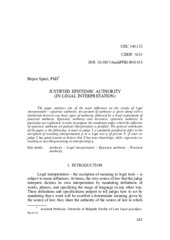Justified epistemic authority (in legal interpretation)
2018
Preuzimanje 🢃
Članak u časopisu (Objavljena verzija)
Metapodaci
Prikaz svih podataka o dokumentuApstrakt
The paper analyzes one of the main influences on the results of legal interpretation - epistemic authority. An account of authority is given along with a distinction between two basic types of authority, followed by a brief explanation of practical authority. Epistemic authority and derivative epistemic authority in particular are explained, in order to propose the conditions under which the influence of epistemic authority on judicial interpretation is justified. The general conclusion of the paper is the following: A court or judge Y is rationally justified to defer to the ascription of meaning (interpretation) p to a legal text q of person X, if court or judge Y has good reasons to believe that X has more knowledge, skills, experience or training in ascribing meaning to (interpreting) q.
Ključne reči:
Practical Authority / Legal interpretation / Epistemic authority / AuthorityIzvor:
Anali Pravnog fakulteta u Beogradu, 2018, 66, 4, 143-155Izdavač:
- Univerzitet u Beogradu - Pravni fakultet, Beograd
Kolekcije
Institucija/grupa
Pravni fakultet / Faculty of Law University of BelgradeTY - JOUR AU - Spaić, Bojan PY - 2018 UR - https://ralf.ius.bg.ac.rs/handle/123456789/1062 AB - The paper analyzes one of the main influences on the results of legal interpretation - epistemic authority. An account of authority is given along with a distinction between two basic types of authority, followed by a brief explanation of practical authority. Epistemic authority and derivative epistemic authority in particular are explained, in order to propose the conditions under which the influence of epistemic authority on judicial interpretation is justified. The general conclusion of the paper is the following: A court or judge Y is rationally justified to defer to the ascription of meaning (interpretation) p to a legal text q of person X, if court or judge Y has good reasons to believe that X has more knowledge, skills, experience or training in ascribing meaning to (interpreting) q. PB - Univerzitet u Beogradu - Pravni fakultet, Beograd T2 - Anali Pravnog fakulteta u Beogradu T1 - Justified epistemic authority (in legal interpretation) EP - 155 IS - 4 SP - 143 VL - 66 DO - 10.5937/AnaliPFB1804143S UR - conv_477 ER -
@article{
author = "Spaić, Bojan",
year = "2018",
abstract = "The paper analyzes one of the main influences on the results of legal interpretation - epistemic authority. An account of authority is given along with a distinction between two basic types of authority, followed by a brief explanation of practical authority. Epistemic authority and derivative epistemic authority in particular are explained, in order to propose the conditions under which the influence of epistemic authority on judicial interpretation is justified. The general conclusion of the paper is the following: A court or judge Y is rationally justified to defer to the ascription of meaning (interpretation) p to a legal text q of person X, if court or judge Y has good reasons to believe that X has more knowledge, skills, experience or training in ascribing meaning to (interpreting) q.",
publisher = "Univerzitet u Beogradu - Pravni fakultet, Beograd",
journal = "Anali Pravnog fakulteta u Beogradu",
title = "Justified epistemic authority (in legal interpretation)",
pages = "155-143",
number = "4",
volume = "66",
doi = "10.5937/AnaliPFB1804143S",
url = "conv_477"
}
Spaić, B.. (2018). Justified epistemic authority (in legal interpretation). in Anali Pravnog fakulteta u Beogradu Univerzitet u Beogradu - Pravni fakultet, Beograd., 66(4), 143-155. https://doi.org/10.5937/AnaliPFB1804143S conv_477
Spaić B. Justified epistemic authority (in legal interpretation). in Anali Pravnog fakulteta u Beogradu. 2018;66(4):143-155. doi:10.5937/AnaliPFB1804143S conv_477 .
Spaić, Bojan, "Justified epistemic authority (in legal interpretation)" in Anali Pravnog fakulteta u Beogradu, 66, no. 4 (2018):143-155, https://doi.org/10.5937/AnaliPFB1804143S ., conv_477 .




